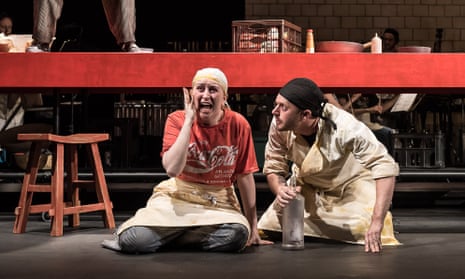At first sight a jaunty skit on life in a Chinese restaurant – table 11 wants a No 6 with peanut sauce – The Golden Dragon unfurls into a harrowing tale of immigration and its consequences. It could hardly be more topical. The Hungarian composer-conductor Peter Eötvös (born 1944) began work on this 90-minute piece in 2013. The refugee issue had suddenly escalated. (Theresa May, then home secretary, memorably announced a bill that would “create a really hostile environment for illegal migrants”.)
By the time of its UK premiere by Music Theatre Wales in Buxton last year, the crisis dominated European politics. This chamber opera, with a cast of five and a 16-strong instrumental ensemble, goes to the heart of the matter. Now MTW is taking it on tour, culminating in a performance at Hackney Empire on 31 October. The nimble, compact production by the company’s co-founder, Michael McCarthy, is superbly conducted by Geoffrey Paterson and expertly performed by all.
Music and text, kaleidoscopic and fast-moving, mix realism and fairytale, humour and horror. Think of a Salman Rushdie short story with a magic carpet thrown in. The score’s use of different styles, from jazzy to spiky to declamatory to lyrical, informally charts Eötvös’s own journey as a composer. He began by writing film and stage music, then spent rigorous years as a Stockhausen disciple in the late 1960s. Now his approach is inclusive and eclectic, as witnessed in his operas Angels in America (2004) or Love and Other Demons (2008, commissioned by Glyndebourne).
The libretto is from a play by Roland Schimmelpfennig (b1967), a leading German playwright whose Brechtian-style plays have been seen here at the Royal Court. A young Chinese man (The Little One, poignantly sung by Llio Evans) has bad toothache. Given his illegal status, he cannot seek medical help. His kitchen colleagues perform a grotesque act of excision with much blood and fatal consequences.
As the main story splinters into others, the cast take on many roles. This opera, as all involved make clear, is about any time, any place. The context may be pan-Asian but no one is cast as a racial stereotype in any respect. Given that the opera has raised some controversy, it’s worth noting that this production was hugely popular at the Tongyeong international music festival, South Korea. The company is now in discussions with the Hong Kong arts festival too. Lucy Schaufer switches from Old Cook to Granddaughter to Ant with aplomb, as does Andrew Mackenzie-Wicks in a similarly polarised range of parts. Two “air stewardesses” – gamely played by Daniel Norman and Johnny Herford, examining their nails and waving their shiny handbags to the manner born – are at dinner after a long-haul flight. The decayed tooth flies through the air and lands, miraculously and revoltingly, in the soup.
The music becomes more haunting as the work progresses through its 22 short scenes. Sharp edges – especially created by the percussion, full of rattles and ratchets and chopping sounds – soften into melancholy, woodwind-dominated elegy. Short lines of text, every word audible, yield to tiny arias. The work ends with The Little One’s body being thrown into the river as he sings of his death and his journey into the afterlife.
This “Homecoming” aria will be performed live on 12 November in the Chinese galleries of the V&A as part of its Opera: Passion, Power and Politics exhibition, which opened a fortnight ago to enthusiastic reviews. It’s an ambitious show, made in collaboration with the Royal Opera House, with plenty to see and enjoy, from Mozart’s piano to a miniature portrait of the castrato Farinelli to a Verdi manuscript. A dazzling clip of Shostakovich playing a few moments of Lady Macbeth of Mtsensk on the piano is worth the ticket price (though it is available on YouTube). The exhibition demands a good deal from the visitor, with lots to read and listen to and look at – no bad thing, but inevitably it struggles with the “book on the wall” problem of many themed exhibitions.

Costumes, objects, scores, instruments show the context of opera from 17th-century Venice to the present, with the focus on seven operatic premieres in seven cities. The huge open space of the new Sainsbury Gallery has been divided accordingly, with a whiz through some contemporary operas – short clips shown on large screens – as a finale. Inevitably this device leads to compromises: Monteverdi’s Poppea (premiered in Venice) rather than the earlier Orfeo (premiered in Mantua); Wagner’s Tannhäuser, first seen in an earlier version in Dresden but here used to illustrate Paris. Strauss’s Salome is presented more as social phenomenon than daring, ingenious work of art. Puccini, an entry point for so many opera-lovers, is all but omitted.
The contents and displays of each of these rooms would be a wonderful contextual asset in a theatre about to perform one of the operas in question. As a method of narrative, it may leave your head spinning, not helped by all the shouty blackboard slogans (“sexuality”, “personal struggle”, “morality”). Headphones, obligatory if you want to hear any music, track where you are standing but shuffle exhaustingly from aria to aria if you move too fast (more guidance, or floor markings, would have been helpful).
Hesitant at perhaps not being the obvious target, I went with three others, operatically informed but not expert, who had a similarly bemused response. The approach, as the three Ps of the show’s title tell you, is cultural history rather than music – understandable given the purpose and resources of the V&A, but a lost opportunity. See it as an enjoyable plate of hors d’oeuvres. It cannot convey the substance of the real thing.
Star ratings (out of 5)
The Golden Dragon ★★★★
Opera: Passion, Power and Politics ★★★

Comments (…)
Sign in or create your Guardian account to join the discussion